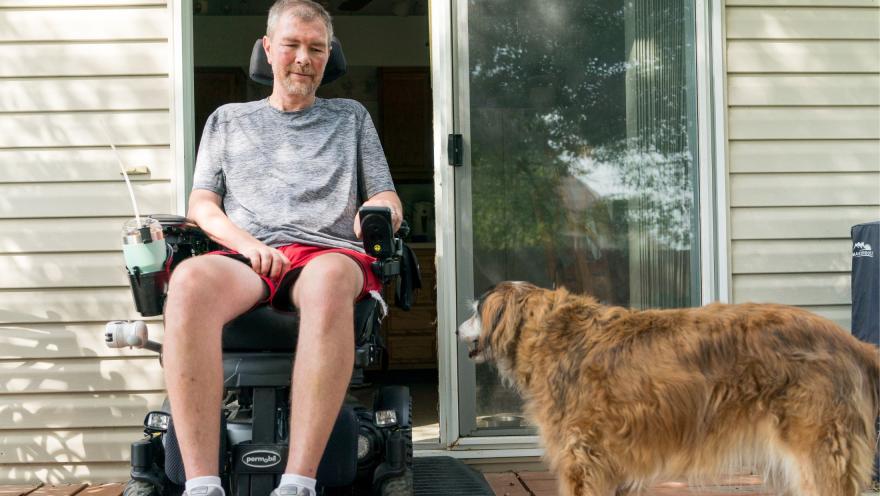We all recall big, milestone moments from our lives: the graduations, weddings, the birth of a child or grandchild, or that time your favorite team won it all. But our lives are mostly made of little, everyday moments: the meals with family, walks with the dog, or listening to the birds on a sunny day in the garden. Paying attention to those big things, while not forgetting to pay attention to the little things, is what palliative care is all about.
By definition, palliative care is a whole-person approach to care that focuses on quality of life, relief from pain and symptoms, and reducing emotional distress for a person living with a serious illness or disease like ALS. While sometimes confused with hospice care, the two types of care are related but very different.
Palliative care can be used at any point on a person’s disease journey, even while they are receiving other treatments and interventions directed toward their disease. The goal is that the person’s wants and wishes are respected, and what can be controlled will be controlled.
Palliative care and its benefits for people living with ALS was the subject of a recent ALS Association webinar entitled “Living Fully, Living Well: Palliative Care Approaches in ALS,” presented by Dr. Ambereen K. Mehta, MD, MPH, FAAHPM, associate professor of palliative care in the Departments of Medicine and Neurology at the Johns Hopkins School of Medicine.
For people living with ALS, palliative care can be beneficial as soon as they are diagnosed. Palliative care professionals can help them fully understand ALS and its likely progression, as well as the interventions that can manage the symptoms they might face. The team can also work with them to maintain function and strength for as long as possible and in the way that works best both for what they need, and what they want.
“Palliative care specialists can help people determine and define what are the ‘everyday things’ that matter to them. Some people may already know what these are but may not have had an opportunity to share this information with their health care team,” Dr. Mehta says. “Others may not know they can share this with their health care team. They may not know where to find help with these ‘everyday things.’

This focus on what is truly important to a person living with ALS can be helpful not only to them, but also to their family and caregivers. By focusing on not just everyone’s physical needs, but their emotional and spiritual needs as well, palliative care reinforces for everyone that they are not in this alone, and that the help and support they need is there for them.
“(Palliative care professionals) understand that to minimize suffering, we must attend to all aspects of that person's life, including their support systems. Palliative care supports loved ones, families, and their care partners by exploring how this disease is impacting their quality of life, identifying stressors—including emotional, financial, and others—and connecting them with resources, for example, those offered by the ALS Association,” explains Dr. Mehta.
As ALS progresses, the palliative care team will have regular, in-depth conversations about what’s important to them and their family. They will also help them fully explore and understand the pros and cons of different treatment choices like feeding tubes, breathing devices, and assistive communication tools.
"Palliative care providers support and encourage conversations with patients to identify and share their medical wishes with their loved ones and care partners," says Dr. Mehta.
We have made a promise to the ALS community that we will make ALS livable for everyone, everywhere, until we can cure it. Ensuring people living with ALS and their families have access to care that pays attention to what they need to live their life as they choose—that pays attention to the “little things”—is part of that promise.
To learn more about palliative care, contact your ALS care team today.
Stay up to date on the latest information about ALS care, disease management and resources to by subscribing to our quarterly e-newsletter, Care Matters.
To continue to follow stories about people living with ALS in the community and learn more about the disease, subscribe to receive our weekly blogs in your inbox HERE or follow us at als.org/blog.


Comments
My wife was diagnosed with ALS last May. I am still a bit hazy on when Palliative Care changed and how to determine whether Palliative or Hospice Care is the “correct” decision but wish we had been able to see this webinar then as it would have helped us plan her medical care. In the end, she received virtually no specialized ALS care and entered hospice care 3 days before she passed. Palliative care may have helped extend her life.
We are incredibly sorry for your loss, D P.
I met Dr Mehta when I took my husband to Baltimore John Hopkins after he was diagnosed because Vanderbilt in Nashville was so horrible. She was wonderful but we lived in Tn. I didn't understand the difference between hospice and Pallative and when Bob got so bad I had no choice but to go right to hospice October of 2023. Hospice did not understand ALS and although they tried it fell very short of what he needed. Bob died January 5, 2024, I struggle every day if I did enough. I was his only caregiver and it was so hard. Caregivers need more help and Hospice needs training on Pallative care and what ALS patients need. I pray everyday for more treatment and more help for ALS patients and their families.
Our condolences are with you for the loss of Bob, Lisa.
Join the conversation. Please comment below.